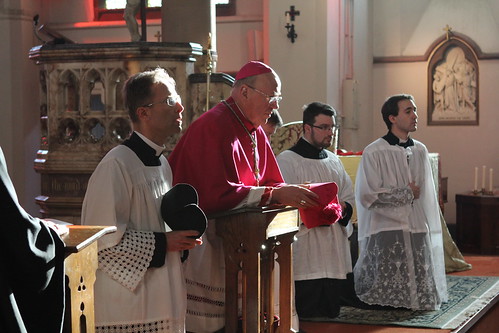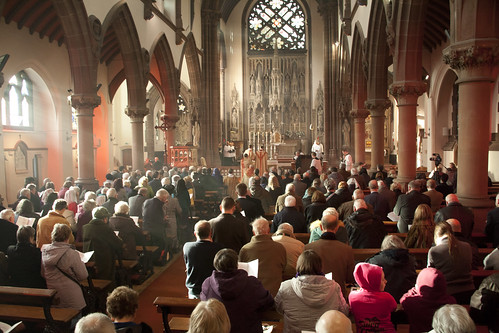 |
| Fr Armand de Malleray FSSP kneels next to Archbishop Malcolm McMahon of Liverpool, in St Mary's, Warrington, before the start of Mass, at which the Archbishop presided. Photo by Martin Gardner. |
This is part of a wider phenomenon in this part of England, where the Catholic population was traditionally the highest, thanks to the resistence of local Catholics to the Reformation, and after 1840 to Irish immigration. St Mary's forms the third of a triangle of impressive, but potentially redundant, churches, which have been given to the care of the Traditional Institutes: two, SS Peter & Paul and St Philomena, at the north end of the Diocese of Shrewsbury, and St Walburge's, Preston, in the Diocese of Lancaster, to the Institute of Christ the King Sovereign Priest, and now St Mary's, in Liverpool Archdiocese, to the FSSP.
Two other northern dioceses, Salford and Middlesbrough, have recently established communities of the Oratorians of St Philip Neri, both of which celebrate Sunday Masses in the Vetus Ordo. Like the the ICKSP and the FSSP, the Oratorians are now looking after fine historic churches.
Elsewhere in the country, the Fraternity of St Peter has a canonically erected house in Portsmouth Diocese, where they share a church, and an official 'chaplaincy' in the Diocese of Northampton.
The significance of these developments is in part that, unlike the secular clergy, the Traditional Mass will not routinely disapear from these locations when a priest is moved, retires, or dies. It is a step of major sympbolic significance, in which the local bishop is necessarily fully involved.
In the last few years, the Traditional Mass, and the priests who say it, have in an important way ceased to be a marginal phenomenon in the Catholic Church in England.
Please say a prayer for Fr Armand de Malleray and his confreres, and for all the priests of these important apostolates, that their labours in the Lord's vineyard will bear much fruit.
